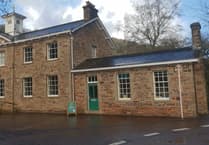A FAILING Exmoor village public house is to close on Sunday (July 28) amid plans to convert it to holiday accommodation which have caused upset in the local community at its loss.
Trudi and Mark Underhill announced a fortnight ago they would close the George Inn, Brompton Regis, at the end of August.
But this week the couple, who had run the 16th century pub since January, 2021, said the closure had been brought forward ‘due to unforeseen circumstances’.
Mr and Mrs Underhill said on social media: “Bottom line is, it is just not financially viable.
“We have tried for the last three years, but with the rising costs of pretty much everything and just not enough people coming through the door, we cannot continue.”
They thanked their ‘loyal staff’ and everybody who had supported them over the past three years.

Now, a planning application for the pub’s conversion to six-bedroom self-contained holiday accommodation has been submitted to Exmoor National Park Authority by Wimbleball Fly Fishery Ltd, which is owned by Mr and Mrs Underhill.
Planning agent Mark Sanders, of Acorn Rural Property Consultants, said Mr and Mrs Underhill had owned the freehold of the pub and its letting rooms for three years.
Mr Sanders said: “Throughout that period the business has traded at a loss and is not viable in the short or longer term.
“The financial accounts for the previous enterprise also show that the business failed to make a consistent and sustainable profit.”
Mr Sanders said no external work was needed on the building for the change of use, and its scale and mass would remain the same, while land immediately next to it would be used as its garden.
He said: “Taking into account the current use of the property as a public house with guests and customers coming and going during opening hours, the proposal is unlikely to have an unacceptable impact on the safety or capacity of the local highway network as trips to and from the property will be reduced.

“In our opinion, the proposed change of use respects the character and historic significance of the building and will conserve it.
“In the absence of securing a viable use for the building, it is vulnerable to neglect and deterioration.
“The proposal will secure a viable and active use that will safeguard the building’s future.”
Mr Sanders said Wimbleball Fly Fishery had offered accommodation at the George Inn as part of the facilities available to visitors to the nearby Wimbleball Lake.
The pub’s George Barn, which had been converted to a two-bedroom cottage in 1989 was also an integral part of Mr and Mrs Underhill’s existing tourism business.
Mr Sanders said the pub’s kitchens and public rooms would support the use of the property as self-catered holiday accommodation.
The George Inn was named after King George I, who reigned from 1714 until his death in 1727, and originally had a thatched roof which was replaced with slates about 60 years ago.



